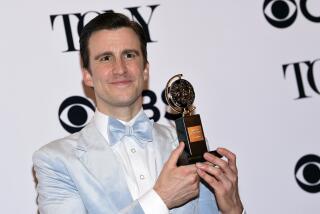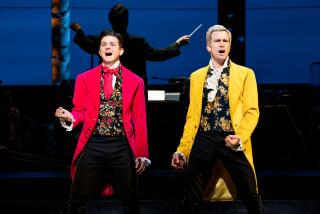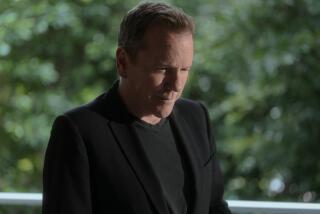From the Archives: Howard Keel, 85; Musical Star Later Joined Cast of ‘Dallas’
- Share via
Howard Keel, who tamed feisty big-screen heroines such as Annie Oakley, Calamity Jane and Shakespeare’s shrewish Kate with his lusty bravado and booming bass-baritone voice, and later became the elegant second husband of Miss Ellie on television’s beloved “Dallas,” died Sunday. He was 85.
Keel died at his home in Palm Desert of colon cancer, his family said.
Six-foot-three, barrel-chested and ruggedly handsome, Keel proved an apt match for the best leading ladies mid-century Hollywood had to offer.
He starred with Kathryn Grayson in “Show Boat,” “Lovely to Look At” and the indelible “Kiss Me Kate.” He paired with Doris Day in “Calamity Jane” and with Ann Blyth in “Rose Marie” and “Kismet.” He romanced Esther Williams in “Pagan Love Song,” “Texas Carnival” and “Jupiter’s Darling.” And he courted Jane Powell in his favorite film, the rousing 1954 “Seven Brides for Seven Brothers.”
Aging and graying gracefully, Keel seemed a natural to replace the original strong father figure Jock Ewing on the runaway hit “Dallas” after actor Jim Davis died of cancer in 1981. Despite audiences’ reliance on Davis, Keel easily assumed the role of elder statesman as Clayton Farlow, capable of standing up to Larry Hagman’s slimy J.R. Ewing, while romancing that character’s kindly mother, Miss Ellie.
Keel, joking that “Dallas” paid him more money than he had ever made in his life although he often worked only 45 minutes a day, remained with the show until it ended in 1991. He never sang on “Dallas,” but the series so reinvigorated his popularity that he landed his first solo recording contract. The result was “And I Love You So” in 1983.
Whenever movie roles dried up, and when his 10-year prime-time television series ended, Keel simply went back to touring with musical stage productions or giving concerts. Among the classics he performed over the decades were “Camelot,” “Man of La Mancha,” “Paint Your Wagon,” “I Do! I Do!,” “Plaza Suite,” “Gigi,” “Show Boat,” “Kismet” and “The Fantasticks.” He had particularly successful tours with Powell in “South Pacific” in 1977 and “Seven Brides for Seven Brothers” in 1978.
“As long as I can sing halfway decent, I’d rather sing” than act, he told The Times in 1989, when he made his Los Angeles concert debut at the Greek Theatre. “There’s nothing like being in good voice, feeling good, having good numbers to do and having a fine orchestra.”
Asked to name his favorite song, he didn’t hesitate: “ ‘Old Man River.’ That’s a great old song, and it fits my voice.”
And vice versa.
Born Harold Clifford Keel in Gillespie, Ill., Keel started life with no foreseeable possibility of the long singing and acting career he later forged. His coal miner father drank heavily and beat his two sons. His strict Methodist mother banned entertainment of any kind.
“I had a terrible, rotten childhood,” Keel said in 1995. “My father made away with himself when I was 11.... I was mean and rebellious and had a terrible, bitter temper. I got a job as an auto mechanic, and I would have stayed in that narrow life if I hadn’t discovered art. Music changed me completely.”
Keel came to Los Angeles in his late teens and worked at Douglas Aircraft through World War II. When a cultured lady friend took him to a concert at the Hollywood Bowl, he was so inspired he began taking singing lessons.
He worked briefly as a singing waiter at the Paris Inn Restaurant in downtown Los Angeles for $15 a week and two meals a day. He also began competing in — and winning — singing contests, and sang in recitals and with the American Music Theatre in the Pasadena Auditorium.
Oscar Hammerstein II selected him in an audition as understudy for leading roles in two major Broadway musicals — “Carousel” starring John Raitt as Billy Bigelow and “Oklahoma” starring Alfred Drake as Curly McLain. Keel played each lead on Broadway and then went to London in 1947 to portray Curly at the Drury Lane Theatre.
He so endeared himself to the British that he toured there regularly over the years.
Keel made his feature film debut in 1948, playing a non-singing convict in the British crime drama “The Small Voice.”
Hollywood lured him home with a seven-year MGM contract. He became an instant star in his first film — playing cocky sharpshooter Frank Butler to Betty Hutton’s Annie Oakley in the 1950 “Annie Get Your Gun.”
After musicals ran their course in the mid-1950s, the burly Keel segued easily into action films and Westerns such as “Waco” with Jane Russell, “Red Tomahawk” with Broderick Crawford and Wendell Corey, “The War Wagon” with John Wayne and Kirk Douglas, and “Arizona Bushwhackers” with Yvonne De Carlo and John Ireland. He also had guest roles on television stalwarts, including “Death Valley Days.”
As one of MGM’s premiere musical stars, Keel was prominent in the retrospective films “That’s Entertainment” in 1974, “That’s Entertainment, Part II” in 1976 and “That’s Entertainment! III” in 1994.
Keel was married and divorced from actress Rosemary Cooper, and from dancer Helen Anderson, with whom he had three children, Kaija, Kristine and Gunnar. In 1970, he married a former flight attendant, Judy Magamoll, with whom he had daughter Leslie. In addition to his wife and children, he is survived by 10 grandchildren and one great-granddaughter.
The funeral will be private. A memorial service will be planned.
From the Archives: Pioneer in Latino Politics in Los Angeles
From the Archives: Ossie Davis, 87; Actor Played a Powerful Role in Civil Rights Gains
From the Archives: Kim Hunter, 79; Won Oscar for ‘Streetcar’
From the Archives: Buddy Ebsen, 95; Actor-Dancer Was Jed Clampett of ‘Beverly Hillbillies’
From the Archives: Jazz Great Duke Ellington Dies in New York Hospital at 75
More to Read
Start your day right
Sign up for Essential California for the L.A. Times biggest news, features and recommendations in your inbox six days a week.
You may occasionally receive promotional content from the Los Angeles Times.






